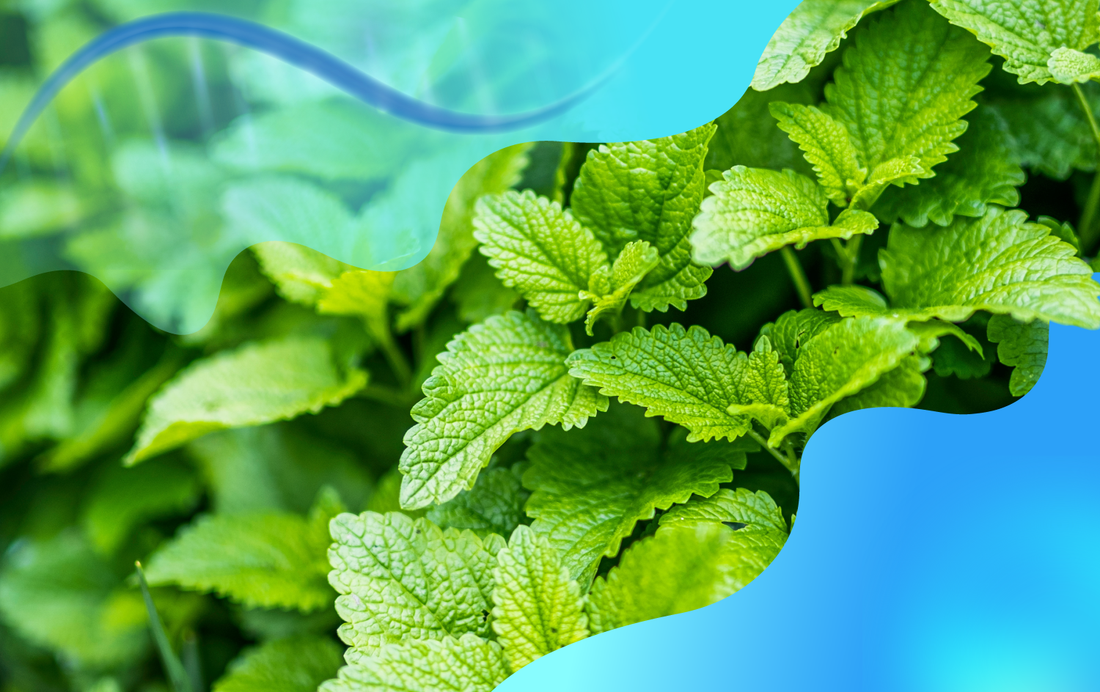
How Lemon Balm Supports Microbiome Health and Whole-Body Wellness
Share
Lemon Balm: An Herb Not a Chapstick!
Lemon balm, also known as Melissa officinalis, is one of those lesser-known medicinal herbs that almost everyone can benefit from. It is best known for its stress-relieving properties, BUT take a look at this list of some other supportive qualities of Lemon Balm:
- Combat anxiety
- Soothe stomach upset
- Reduce stress
- Relieve gas
- Induce sleep
- Fight infection
- Support cognitive function
- Induce sweating
- Boost immunity
- Used in a variety of skin and beauty care formulations
When an herb touts such a robust history of effectiveness, medical science takes notice. As a result, there is a growing body of research proving lemon balm’s efficacy on digestive health, stress, mood, and more (and we’ll explore all this research coming up).
Keep reading for tips on how to get more lemon balm into your diet and health regime!
A “Balm” for All That Ails You (and your disbiotic gut)
Gut dysbiosis is a condition that causes an imbalance of good to bad bacteria within the microbiome, and it is often rooted in infectious disorders.
This is potentially significant because lemon balm has also been shown effective in:
- combating pathogens
- fighting inflammation
- improving immunity
And pathogens, inflammation, and a weakened immune system are recipes for disaster with regard to the health of the microbiome.
Here are 2 examples of how lemon balm specifically benefits the microbiome:
- Irritable bowel syndrome (IBS) is often caused by an alteration of the gut microbiota due to gastrointestinal infection, intestinal dysbiosis, or SIBO (small intestinal bacterial overgrowth). It can be treated with antibiotics, but that typically leads to more gut health issues down the road. Fortunately, research has shown that the essential oils of lemon balm, peppermint, and coriander were even more potent than the antibiotic rifaximin in fighting IBS-specific bacteria, such as E. Coli.
- One study published in the Journal of Medicinal Food found that lemon balm, when used alone, improved gut motility in the small intestine. The researchers believe this is due to specific phenolic compounds, such as rosmarinic acid, a powerful antioxidant and anti-inflammatory found in other members of the mint family.
Here are additional research studies showing the effectiveness of lemon balm for:
Feeling Anxious? Lemon Balm to the Rescue!
It’s a rare human being who doesn’t experience anxiety at some point in life. Whether it’s a diagnosed anxiety disorder (which affects a whopping 18% of Americans) or mild anxiety brought on by stress: Feeling anxious is extremely common...and extremely disruptive! Lemon balm is believed to work on anxiety due to its natural sedative and anti-stress properties, which also help to improve sleep.
But I would suggest that its effectiveness on anxiety and stress aren’t limited to its sedative actions, but also its antimicrobial properties. Which, as previously discussed, have been shown effective against gut infections.
Researchers have established a link between our microbiome and our brain, appropriately called the Gut-Brain Axis (GBA). The GBA is a remarkable network of millions of nerve cells that runs from your brain all the way to your anus and is responsible for those “gut feelings” and “nervous stomachs” we all experience.
It also shuttles information from the gut to the brain and vice versa. Thus, if your gut health is sub-optimal it can greatly impact your mood and brain power, and if your brain health is sub-optimal it can negatively impact your gut.
A prime example of this is the growing body of research showing that anxiety and depression are common in those with gastrointestinal disorders.
Other ways in which lemon balm may impact the gut-brain-connection can be found in the research on how this herb positively impacts:
- Cognitive performance
- Mood
- ADHD
- Symptoms of dementia
All of which research has suggested may be rooted in gut health ailments.
Got Herpes? Use Lemon Balm!
Another amazing property of lemon balm is its antiviral action on Herpes outbreaks. Several studies have shown that when applied topically, lemon balm was effective in neutralizing Herpes simplex virus type 1 (HSV-1), type 2 (HSV-2) and an acyclovir-resistant strain of HSV-1 (ACV). Some doctors say it can cut healing time by half, but that could depend on how quickly you start using it, how often you use it, and how severe the outbreak.
To use topically, you can soak a cotton ball in lemon balm extract and apply it directly to the outbreak. You can also use lemon balm tea, either on a cotton ball or as a soak/wash. There are also products containing lemon balm that can be helpful.
And since herpes outbreaks are often due to stress, you may also benefit from enjoying lemon balm internally as a preventative measure.
5 Tasty Ways to Enjoy Lemon Balm!
It’s easy enough to go out and buy a high-quality lemon balm tincture or supplement. However, the glorious flavor of this grassy, lemony herb may very well earn it a distinguished place in your culinary repertoire.
Here are 5 easy & delicious ways to enjoy it:
- As a tea—infuse fresh or dried lemon balm with freshly boiled water to taste. Add a little raw honey if desired. Enjoy before bed to enhance relaxation or blend with green tea for a balanced morning pick-me-up.
- Blended into pesto—combine half fresh basil with half lemon balm for a lemony medicinal twist on your favorite pesto recipe.
- Infused into lemonade—muddle fresh lemon balm with your favorite unrefined sweetener and fresh lemons. Add water and let steep at least 30 minutes to overnight. You can also add strongly brewed lemon balm tea to prepared lemonade (preferably organic, naturally sweetened) to cut the sweetness.
- Added to popsicles—fresh lemon balm or lemon balm tea can be added to your favorite homemade popsicle blends. Try mango lemon balm or raspberry-peach lemon balm smoothie popsicles, with a little added gut-friendly collagen or gelatin, for a healing summer treat.
- Added fresh to salads or fresh/dried to dressings—it complements citrus-based dressings beautifully.
Grow Your Own? Yep! And It’s Super Easy
Lemon balm is easy to find in stores, but it’s also easy and satisfying to grow your own! And as a perennial, you can harvest and re-harvest the leaves several times per season—it will even grow back the next year.
You can either grow it from seed or procure a lemon balm plant from your local nursery. This herb is super hardy, so you can typically just stick it in a nice sunny place (pot, planter, or ground), water it occasionally and watch it flourish. Tea can be made from the fresh leaves, or you can dry it for a more potent brew, or to make tinctures.
Enjoy often for best results!
So, whether you have a specific ailment or are just looking for general wellness, lemon balm could be the answer! Pair it with a high-quality, 100% spore-based probiotic for maximum benefit and to ensure that you maintain a balanced microbiome. Lemon balm is an all-natural way to support whole-body health.

Dr. Alejandra Carrasco, MD, IFMCP
Family Medicine and Integrative and Holistic Medicine Doctor
A board-certified physician, Dr. Carrasco, is the bestselling author of Bloom: 7 Steps to Reclaim Your Health, Cultivate Your Desires, and Reignite Your Spark, as well as a wife and mom of three. She founded the Austin, TX functional and integrative medicine practice, Nourish Medicine, and co-founded the online resource for moms and motherhood, Hey Mami. Dr. Carrasco holds board-certifications through the American Board of Family Medicine, and the Institute of Functional Medicine.
Collective members are paid sponsors and receive compensation for their content, but all opinions are their own.
